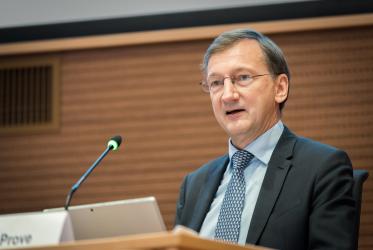I am very glad to send greetings to mark the festival of Rosh Ha-Shanah, and the beginning of the High Holy Days to members of the Jewish community. Throughout this year we have been very aware that it is the 50th anniversary of the promulgation of the Vatican II document Nostra Aetate and the celebrations of this ground-breaking document are shortly going to draw to their climax in Rome on October 28 – exactly 50 years to the day since the document was authorized, by an overwhelming majority of those present. The World Council of Churches is pleased that it will be represented at this important event. Nostra Aetate is a document whose impact certainly extended far beyond the Roman Catholic Church. I know how widely it has been appreciated in the Jewish community and has been seen as a vital seed for the development of strong relationships between Catholics and Jews in the half century since it appeared. Nostra Aetate has also influenced other Christians, churches and Christian organizations such as the World Council of Churches. We are glad to acknowledge the debt we owe to it in the development of our own inter-religious work. It was not so much exactly what Nostra Aetate said in terms of specific practical suggestions, but the warm spirit of openness expressed within the document which signaled a determination to place relations between Jews and Christians, and indeed people of other religious traditions, in a new, and very positive, framework.
We have also been told that those who worked towards the eventual publication of Nostra Aetate had in their turn been influenced by the powerful statement made at the First Assembly of the World Council of Churches, in Amsterdam in 1948 that, ‘Antisemitism is sin against God and man.’ We are proud that this should be the case.
One of the most sensitive Roman Catholic reflectors on Jewish-Christian relations, Cardinal Walter Kasper, has spoken of Judaism as being for Christians, ‘the sacrament of every otherness’. That of course is looking at our mutual relationship from a Christian perspective, and it may well be that you, and other Jewish friends, want to challenge us to look at the story in a different way. But the phrase certainly resonates with the wisdom of the Jewish philosopher Emmanuel Levinas, who has written eloquently of the importance Judaism gives to the welcoming of ‘the other’. For me, a fundamental text for our understanding of the importance of ‘the other’ comes in our shared scripture, the Book of Genesis. For after Jacob’s strenuous struggle by night with the angelic figure at the Fords of Penuel, and his eventual exultant cry, ‘I have seen God face to face and yet my life has been preserved’(Genesis 32.30), the next morning Jacob greets Esau, the brother from whom he has been alienated so long, with the words, ‘Your face is like the face of God to me, with such graciousness you have received me’(Genesis 33.10). The conjunction of the two texts in this way suggests to me that we, Jews and Christians, two religious traditions which both believe that human beings are created in the image of God, are being challenged to perceive the face of God, in the faces of those who are ‘other’ to us.
It is of course a major – indeed overwhelming – challenge for us in Europe at the present time. How we respond to the ‘other’ , the refugees who are seeking safety in our wealthy and comparatively peaceful continent, will constitute the defining perception of Europe for our age, our time. In this struggle to encourage our countries to be open to the other, people of faith have an essential part to play. For me – and I am sure for many others – the pictures of the refugee children of today constitute a powerful reminder of events such as the Kindertransport, the convoys of Jewish children who managed to escape the evil of Nazidom through the willingness of at least a few Europeans to welcome others and to care for them. Seventy years on Europe is again facing a time of reckoning. As pilgrims on a journey of peace and justice we must pray for wisdom to help make the right response.
Rev. Dr Olav Fykse Tveit
WCC general secretary


